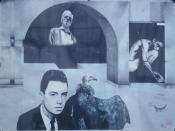Rene Descartes believed in doubting every proposition that cannot be known with certainty. Albert Camus follows this same lead but unlike Descartes observes that philosophers generally seem to be unable to agree on metaphysical questions, and takes that as a reason to doubt metaphysics all together. His position seems to be profoundly un-philosophical and his interest is purely in how to live. The primary matter here is that there are no clean-cut answers to any questions, so is it even possible to live with certainty. From The Myth of Sisyphus Camus exclaims in his argument Absurd Freedom of the section An Absurd Reasoning that "we cannot be certain about any rational order or meaning in the universe." (Camus, p. 477) This claim in Camus point-of-view comes from the awareness that the greatest Western minds of the past 2,000 years haven't been able to agree on a correct answer, and therefore we are unlikely to be able to discover certainty either.
Camus admits, "I don't know whether this world has a meaning that transcends it. But I know that I do not know that meaning and that it is impossible for me just now to know it." (Camus, p. 477) It is my assumption that Camus suggests that perhaps this meaning is knowable, but not without a considerable effort that would prevent him from actually exercising its living. "The present and the succession of presents before a constantly conscious soul is the ideal of the absurd man," I presume he wants to know if he can live with the certainty he has in this present time and with nothing more. (Camus, p. 486)
The absurd man demands certainty above all else, and recognizes that he can only be certain of the absurd. The only truth about himself that remains constant is...


